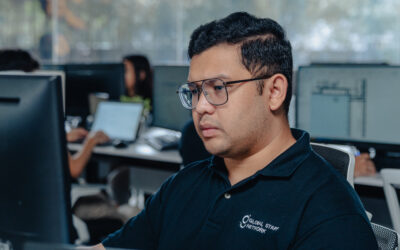Recruitment is more than just filling open positions. At the heart of every successful business lies a strategic hiring process that ensures the right people are placed in the right roles. To understand how this happens, it’s essential to look behind the scenes. This article walks you through the daily operations of an Australian recruitment company—from sourcing top talent to final placement—highlighting how each stage plays a role in driving business and career growth.
Whether you’re an employer looking to understand how a recruiter supports your workforce or a job seeker curious about what happens after you apply, here’s a clear view into how an Australian recruitment company operates.
1. Early Morning: Reviewing Client Needs and Prioritising Roles
A typical day begins with reviewing client updates and prioritising hiring requests. Every Australian recruitment company works closely with its business clients to align job openings with current organisational goals. This morning check-in helps recruiters assess which roles are urgent, which need more sourcing, and what stage each client is at in the recruitment funnel.
Recruitment consultants often meet internally to assign roles based on expertise or industry focus—whether it’s IT, construction, finance, healthcare, or administrative support.
2. Candidate Sourcing: More Than Just Job Ads
Sourcing candidates is one of the most dynamic parts of an Australian recruitment company’s workflow. Recruiters don’t rely solely on job boards. Instead, they use a mix of platforms—LinkedIn, internal databases, referrals, and recruitment software—to proactively find the best matches.
They also scan through previous applications and talent pools created from earlier projects. This proactive strategy enables the recruitment company to deliver faster results while maintaining quality.
3. Screening and Initial Interviews: Quality Over Quantity
Once suitable candidates are identified, screening begins. This involves reviewing CVs, portfolios, qualifications, and experience. Then, recruiters conduct phone or video interviews to assess each candidate’s personality, communication style, and role suitability.
An Australian recruitment company applies strict compliance checks and ensures all candidates meet Australian employment laws and industry-specific certifications. This is especially crucial for roles in healthcare, engineering, and skilled trades.
4. Midday: Client Communication and Progress Reports
By mid-morning or early afternoon, communication with clients takes centre stage. Recruiters provide hiring managers with progress updates, shortlists, and candidate profiles. A good Australian recruitment company acts as a partner, not just a supplier, ensuring clients are involved and informed throughout the process.
These touchpoints also offer a chance to refine job briefs, confirm interview availability, and address any changes in job scope.
5. Candidate Preparation and Coordination
Another essential part of the process is preparing shortlisted candidates for interviews. The Australian recruitment company ensures candidates understand the company culture, interview format, and employer expectations.
This preparation phase includes:
- Mock interviews
- Coaching sessions
- Role-specific briefings
- Background checks and references (where applicable)
By doing this, the recruitment agency not only supports the candidate’s success but also helps the employer make quicker, more informed hiring decisions.
6. Afternoon: Interview Follow-ups and Offer Management
Post-interview, recruiters serve as the bridge between the candidate and the employer. An Australian recruitment company gathers feedback from both sides, discusses potential adjustments, and facilitates negotiations around salary, start dates, and benefits.
Offer management is often one of the most delicate tasks of the day. Recruiters ensure that expectations are met on both sides and help navigate counter-offers or concerns. Their goal is to secure long-term placements that work for both client and candidate.
7. Closing the Day: Documentation, Onboarding, and Database Updates
As the day wraps up, documentation and compliance come into focus. Recruiters finalise contracts, update internal CRMs, and log key metrics like time-to-hire and candidate feedback.
If the role has been successfully filled, the Australian recruitment company begins onboarding support—sending welcome kits, liaising with HR teams, and scheduling induction activities.
This stage ensures a smooth handover and often includes ongoing follow-up during the employee’s first weeks or probation period.
The Role of Technology and Compliance in the Daily Workflow
Behind every efficient Australian recruitment company is a robust system of tools and technology. Recruitment software, AI-based matching systems, and compliance checks all work together to streamline the hiring process. These platforms support efficiency, maintain legal standards, and help keep records updated in real time.
Moreover, data privacy laws, Fair Work Australia guidelines, and visa/work permit requirements are strictly followed, making local recruitment agencies essential partners for businesses operating in regulated industries.
Why This Behind-the-Scenes Workflow Matters to Employers and Job Seekers
Understanding the daily operations of an Australian recruitment company reveals the depth of effort required to match candidates with the right roles. From personalised candidate engagement to legal compliance and interview preparation, each task contributes to a high-quality outcome.
For businesses, it means faster hiring, reduced turnover, and better cultural alignment. For candidates, it means greater visibility, tailored support, and a better chance at finding meaningful, long-term work.
Final Thoughts
The success of any Australian recruitment company lies in its ability to balance human insight with technology and compliance. From the morning strategy meetings to the afternoon negotiations and follow-ups, every hour is designed to deliver value—both to the client and the candidate.
By lifting the curtain on what happens inside the hiring game, it becomes clear that recruitment is not just a process—it’s a partnership built on expertise, consistency, and people-first values.








0 Comments